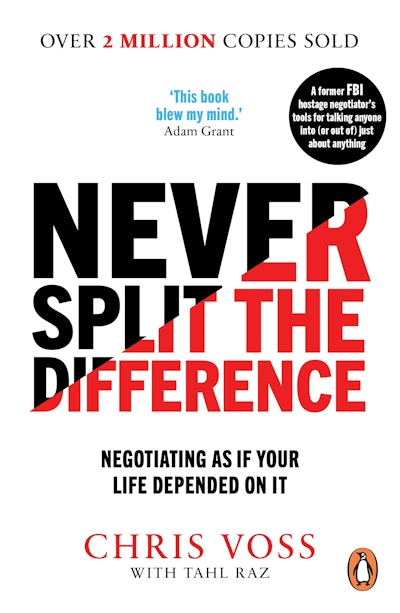Learn how to politely confront someone with this simple strategy from Never Split the Difference by Chris Voss.
Nobody likes the idea of confrontation. Aggression, conflict, and discomfort all come to mind when you imagine what a typical ‘confrontation’ entails – but it doesn’t have to be that way.
In Never Split the Difference, Chris Voss, former FBI negotiator, lays out the rules for negotiating productively. While negotiation and confrontation might seem unrelated, every negotiation essentially begins with a confrontation. By knowing how to deal with confrontation effectively, you can not only reduce fears around speaking up, but you’ll also be on the path to better outcomes for yourself.
To start, you must first know the principles of mirroring.
By employing a skill Voss calls mirroring, you can diffuse most confrontations in four simple steps.
Mirroring, also called isopraxism, is essentially imitation. It’s another neurobehavior humans (and other animals) display in which we copy each other to comfort each other. It can be done with speech patterns, body language, vocabulary, tempo, and tone of voice. It’s generally an unconscious behavior— we are rarely aware of it when it’s happening — but it’s a sign that people are bonding, in sync, and establishing the kind of rapport that leads to trust.
It’s almost laughably simple: for the FBI, a “mirror” is when you repeat the last three words (or the critical one to three words) of what someone has just said. Of the entirety of the FBI’s hostage negotiation skill set, mirroring is the closest one gets to a Jedi mind trick. Simple, and yet uncannily effective.
So, how do you employ mirroring in a confrontation setting?
Voss explains the simple steps:
1. Use the late-night FM DJ voice.
2. Start with “I’m sorry . . .”
3. Mirror.
4. Silence. At least four seconds, to let the mirror work its magic on your counterpart.
Repeat.
The next time you’re faced with a frustrating situation or request follow these steps to work through the confrontation.
For example, imagine an argument with your partner about loading the dishwasher.
- ‘You never wash the dishes properly,’ says your partner.
- Mirroring that statement might look something like asking ‘I’m sorry. Properly?’
- Wait for your partner to respond. They might say: ‘Well you sometimes do it okay, but you put the forks in the wrong way this time.’
- You could ask, ‘what do you mean by that?’
- ‘You put them upside down!’ says your partner.
- ‘Oh, I didn’t realise there was a right-side up.’ You might answer. ‘How would you like me to put them?’
- Now that the situation is diffused, your partner probably cares less than they did initially. ‘Never mind,’ they might respond. ‘It’s not a big deal actually, they’ll get clean either way.’
Never Split the Difference summary
Looking for more helpful negotiation tips? Never Split the Difference is the perfect place to start.
In this international bestseller, you will learn tricks and strategies to give you the competitive edge in any discussion. Not only are the skills in the book helpful in business situations, but they can also help improve your relationships, family life, and overall communication skills.
Thanks to Voss' FBI background, the skills laid out in Never Split the Difference have been tried and tested for everyday life and extreme circumstances.
About Chris Voss
After working as a police officer in Kansas City, Missouri, Chris Voss joined the FBI as a kidnapping negotiator. His position put him directly in touch with some of the most dangerous criminals. Dealing with bank robbers, gang leaders, and terrorists, Voss had to negotiate in extremely high-stakes situations.
Never Split the Difference outlines the nine key principles that helped him and his colleagues to successfully negotiate when it mattered most – when people’s lives were at stake.
More books like Never Split the Difference
You might also like:
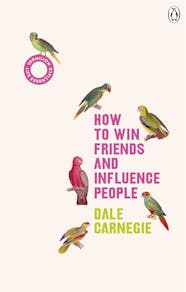
How to Win Friends and Influence People by Dale Carnegie
Perfect your social skills and master any conversation.
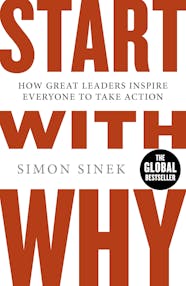
Start With Why by Simon Sinek
Unlock the secret to inspirational business by learning to ask 'why'.
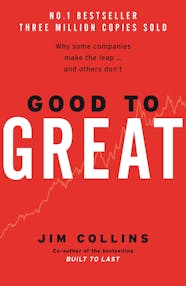
Good to Great by Jim Collins
How to make the leap from good to great, based on five years of research.
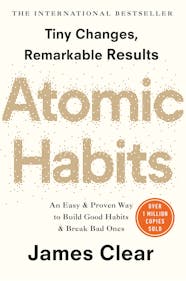
Atomic Habits by James Clear
Tranform your life with tiny changes in behaviour, starting today.
Looking for an inspirational read? Check out the 22 of the best inspirational books of 2022.

